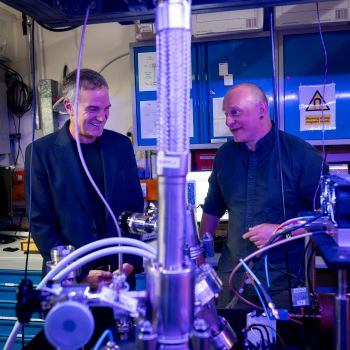Physics and Astronomy news
Read the latest news from the Physics and Astronomy department.
Secretary of State hails Sussex’s quantum department for driving UK’s economic growth
By: Tom Latchem
Last updated: Wednesday, 20 August 2025

• The Secretary of State for Science, Innovation and Technology (DSIT), Peter Kyle, visited the Sussex Centre for Quantum Technologies (SCQT), at the University of Sussex, praising it for creating high-value jobs and investment in Greater Brighton’s emerging ‘Quantum Silicon Valley’.
• During his visit to the University, Mr Kyle learned about Sussex’s plans to construct the world’s most powerful computer, capable of solving some of the world’s most pressing challenges, and its world-record breaking discoveries.
The University of Sussex’s quantum department has been hailed for the role it is playing in the UK’s future economic prosperity by the Secretary of State for Science, Innovation and Technology (DSIT), Peter Kyle.
Speaking on a tour of the Sussex Centre for Quantum Technologies (SCQT), on Friday 15 August, as part of a ministerial visit to the University’s Falmer campus, Mr Kyle said he was impressed by how cutting-edge research and specialised training are driving investment into Greater Brighton, supporting plans to create a ‘Quantum Silicon Valley’ in the region.
Mr Kyle said such work was crucial for building the talent, companies and technology that the UK needs to turn breakthrough science into national economic prosperity.
The visit comes a month after the announcement of a world-record discovery in quantum sensing by Sussex researchers, and after the Government’s industrial strategy dedicated £670 million to accelerating the application of this revolutionary technology to enable the construction of quantum computers by 2035.
Quantum computing is set to change the way we work and live, solving previously unsolvable industry problems from health diagnostics to cyber security, boosting our economy and improving daily lives.
Science and Technology Secretary, Peter Kyle said:
“The amazing work I have seen at the University of Sussex and Universal Quantum is exactly the kind of regional innovation our Industrial Strategy is designed to support and encourage.
“The innovations taking place here are a great example of how world-class research and teaching can create the skills and jobs that improve lives right across the country, whilst also maintaining our global position as a pioneer in quantum technologies for the long haul.”
According to a recent report by Oxford Economics, cited in the Government's Modern Industrial Strategy Sector Plan for Digital and Technologies, quantum computing is predictedto create 126,100 UK jobs by 2045 and add £11 billion to its GDP.
As part of its wider Modern Industrial Strategy, the Government will invest to create a new quantum industry sector capitalising on world-leading breakthroughs that have been made in the UK, including at Sussex.
The University of Sussex is a global leader in quantum technologies. Through SCQT, it is delivering breakthroughs that bring the UK closer to utility-scale quantum computing capable of tackling society’s toughest challenges.
Its spin-out, Universal Quantum, has already secured around £100 million in investment, as part of Greater Brighton Economic Board’s plans to grow a ‘Quantum Silicon Valley’ in the region.
During his visit, the Secretary of State met with Professor Winfried Hensinger, who leads the Sussex Centre for Quantum Technologies and co-founded its spin-out company UniversalQuantum, to learn about the University’s groundbreaking research in quantum computing and its role in driving forward the UK’s technological and economic ambitions.
Professor Winfried Hensinger said:
“We were delighted to share with the Secretary of State how Sussex is converting frontier quantum science into practical technology – from record-setting sensing to the engineeringrequired for utility-scale quantum computers.
“It’s a most exciting time being able to say that have some of the world’s most powerful computing technology being developed right here in the UK. We are working on growing astep-changing ‘Quantum Silicon Valley’ and the construction of the world’s most powerful computer right here in Greater Brighton.”
“By working with government and regional partners, we can accelerate new industries, build resilient supply chains and deliver productivity gains for the UK.”
Professor Sasha Roseneil, Vice-Chancellor and President of the University of Sussex, said:
“It was a real pleasure to welcome the Secretary of State to the University of Sussex, and to share some of the extraordinary research and innovation that is driving technological change and contributing to the UK economy.
“The University of Sussex is investing significantly in quantum computing to support our world leading researchers, whose work has the potential for enormous positive impact to the benefit of both the UK and the whole world.
“The University of Sussex and the greater Brighton area have a plan to create a ‘Quantum Valley’ in Sussex, with the University acting as a catalyst. The University has one of the most comprehensive high level training programmes in the world, which includes a four-year quantum technology undergraduate degree and the UK’s first quantum technology online distance learning degree.
“We look forward to working with the DSIT and the UK government and contributing to the economic growth of our region and of the country through further developments in quantum research at the University in the future.”
Mr Kyle’s visit to the University of Sussex’s campus follows a visit in March by the Minister for the Future Digital Economy, Baroness Jones, who, after a similar tour of the University’squantum labs, commented:
“Supporting innovation hubs like this one will help British researchers to continue making breakthroughs in emerging technologies that could improve everything from heath diagnostics to cyber security, boosting and improving daily lives.
“The work on quantum here at the University of Sussex is a great example of how world-leading research is evolving into successful spin-out companies, creating jobs and attracting investment right across the UK, delivering on our Plan for Change.”